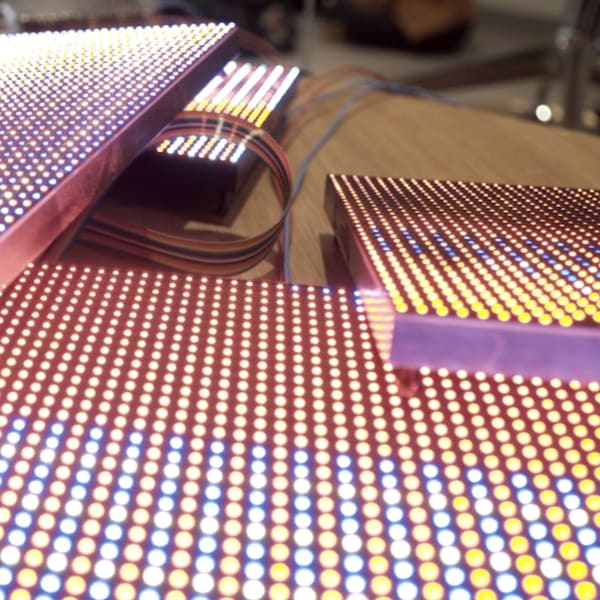Course units
Year 0 (common with BSc Computer Science)
Foundational Programming One (20 credits)
This unit will introduce you to core programming skills and concepts. You will explore basic coding Interactive Development Environments for Processing and block programming and multimedia frameworks.
Computing Histories (20 credits)
This unit will help you develop academic writing skills and offer diverse historical perspectives of computing.
Computing Project: Introducing Computing One (20 credits)
This unit will introduce carrying out practical computing projects. You will work independently on simple tasks such as creating interactive graphics, sound, visualisations, and/or making simple games.
Foundational Programming Two (20 credits)
This unit will build on programming fundamentals including variables, conditionals, loops, functions, and objects, and provide insights into how you can use data to create basic 2D graphics, sound, and utilise simple algorithms.
Foundational Maths for Computing (20 credits)
This unit introduces foundational mathematical methods and concepts in an easily accessible and visually applied way.
Computing Project: Introducing Computing Two (20 credits)
In this unit, you will continue to develop your individual and collaborative working process by responding to creative prompts and contemporary projects in computer science-related fields. You will learn basic code and project management basics to make your process more robust, resilient, and sharable.
Year 1
Methods 1: Introducing Computer & Data Science: (20 credits)
This unit will introduce you to the discipline of computer science and the sub-discipline of data science and their effects on the wider world that we all live in. Each is a mixture of art, science, and engineering that continues to shape us, from individuals to large organisations like governments. To better understand their influence, you will become literate in computer programming languages such as JavaScript and Python and become familiar with basic mathematics that are useful for applications from basic data processing to real-time multimedia programming
Critical 1: Mathematics and Statistics for Data Science (20 credits)
This unit will introduce you to the fundamentals of mathematics and statistics. You will explore key theories and approaches that support contemporary statistical reasoning, and the general mathematical principles upon which they depend.
Critical Project 1: Data, Representation and Visualisation (20 credits)
In this unit, you will explore how information is represented as data, and how different types of data can be organised, stored, analysed, and interrogated. You will also learn how to use different programming languages and data representations to create, navigate and analyse complex data structures.
Methods 2: Data Applications in Wearable and IoT (20 credits)
This unit will provide hands-on learning from scratch as how to explore physical computing and Internet of Things technology to develop products for various sectors including fashion and robotics. The unit is curated in such a way that students would be encouraged to explore various interdisciplinary collaborations to leverage different skills that may be required to accomplish the project goal of their choice. Moreover, the data collected through this project should be analysed and the outcomes to be documented through their independent portfolios. This unit will celebrate group and individual efforts through multiple elemental assessments. This unit will not only serve as foundation for upcoming project development-based units but also has the potential as independent career path on further exploration.
Critical Project 2: Database Systems for Data Science: Hybrid and Cloud Integration (20 credits)
This unit will introduce fundamentals of data, managing database systems, handle relational and NoSQL databases, entity modelling and ER diagrams and discuss case studies under data science applications of databases. This unit will also introduce to few cloud-based data storage and management which will be later utilised towards your project developments in later years.
Critical 2: Data Governance, Privacy Compliance and Computational Ethics (20 credits)
In this unit, you will be taught what it means to represent people as data points and explore the effects of data abstraction at a macro scale on individuals and marginalised groups. You will also explicitly look at the use of data in public policy making. Also this unit will intend to cover the aspects of the data regulation conditions in the acquisition, processing, and storage of data in computer systems. Furthermore, investigate legal definitions encompassing Personal Data, Intellectual Property, and Data ownership within the context of key concepts of UK legislation governing data collection, storage, and access (beyond data governance, Bias etc)
Year 2
Methods 3: Algorithms and Complexity (20 credits)
You will be introduced to a range of standard algorithms used in computing for topics such as searching, sorting, data structures, and analysis. You will implement them and analyse their efficiency, performance, and complexity using formal and informal types of notation that will be introduced in the unit. You will also think critically about how the abstract, automated decision-making of algorithms might have unintended or negative effects on real-world data, especially how they might have harmful effects on smaller populations due to a primary focus on efficiency.
Critical 3: Organisations and Computing Entrepreneurship (20 credits)
This unit allows you space to develop your understanding of what type of organisations exist that you may want to work for, with, or to start on your own.You will explore a range of different organisations in different industries, such as companies, start-ups, non-profits, divisions of governments, NGOs and small collectives through case studies and guest lectures. These will help you understand why different organisations have different structures and business models and may lead you to third-year placements, since this unit appears early in year 2 of your studies.
Critical Project 3: Software Development with Database Integration (20 credits)
In this unit, you will explore the dynamic intersection of data science and software engineering. Commencing with principles of project initiation, define objectives and align software engineering practices with the distinctive requirements of data-driven projects. Uncover data engineering foundations to grasp effective strategies for data collection, pre-processing and including the integration of a database into your project.
Methods 4: Deep Learning and Big Data Integration: Technologies and Tools (20 credits)
In this unit you will explore the convergence of deep learning and big data in this unit, examining processing intricacies through tools like MapReduce. You will gain insights into distributed storage, retrieval principles, and construct efficient data pipelines. Throughout, you will cover topics such as Hadoop, Spark, data warehousing, and diverse storage technologies, mastering the integration of deep learning for advanced big data analytics.
Critical 4: Machine Learning for Data Science and Ethical Computing (20 credits)
In this unit, you will learn the fundamental principles of Machine Learning crucial for Data Science and AI. You will be able to achieve expertise in the advanced data wrangling skills in the realms of data cleaning and pre-processing, building upon the knowledge acquired in earlier modules. This unit will also help you to explore the application of various Machine Learning algorithms within the domain of data science, while also gaining insights into the pivotal role of ethical considerations with fairness as a critical principle to eliminate bias and ensure equal treatments
Critical Project 4: Data Science Project: Software Development with Big Data and Cloud
In this unit, you will deliver a substantial software project based on knowledge and competencies that you have developed so far on the course. You will develop projects that will address specific problems and challenges across a range of case studies or use cases that represent arts or science or their intersection.
Year 3
Methods 5: Artificial Intelligence and Advanced Analytics (20 credits)
Machine learning and Artificial Intelligence is at the core of modern industries. The ML competencies that you have developed so far will come handy in this unit. You will examine more complex intelligent systems design, cloud-based deployments including neural networks, reinforcement learning and other critical techniques such as Natural Language Processing and Computer Vision and apply them to different contexts such as audio, video and image generation and data analysis.
Critical 5: Data and Cybersecurity (20 credits)
This unit will build on your understanding of contemporary data security methods. You will be taught to use techniques including static program analysis and threat analysis. You will also use tools to analyse security risks in online applications.
Critical Project 5: Applied Analytics: Data-driven Product Development (20 credits)
This unit will focus on leveraging data analytics to inform and optimize every stage of product development. You will learn to leverage data to inform UI design, optimize testing processes, and refine product architecture. Key areas include advanced project management, cost estimation, and predictive analytics to develop scalable, innovative, and business-aligned solutions. The unit also emphasizes practical applications and collaboration, preparing you for interdisciplinary, analytics-driven roles in fast-evolving industries such as technology, digital media, creative arts, and design innovation.
Critical 6: Responsible Data Science: Equity, Consent, Innovation and Ethics (20 credits)
In this unit, you will consider and reflect on critical approaches to technology development, particularly as they pertain to data science and AI, building on the design ethics work delivered throughout the course so far. You will be encouraged to apply these techniques to your Final Year Project, exploring how you have applied your knowledge of computing ethics in your work.
Critical Project 6: Final project (40 credits)
This will be your final thesis project, where you will demonstrate your skills and understanding of a range of creative computing methods and approaches including statistical methods, software engineering, data visualisation, machine learning and AI, NLP, CV, data security, and other essential topics in the discipline.
Diploma in Professional Studies (Optional year)
The Diploma in Professional Studies (DPS) is an optional placement year in industry between the second and third year of the course. It is a managed year of professional experience, largely undertaken in the design profession in a variety of national and international locations. Successful candidates are selected on a competitive basis from academic performance and studentship, successful completion of the Diploma Higher Education (year 2) and by portfolio and proposal.







